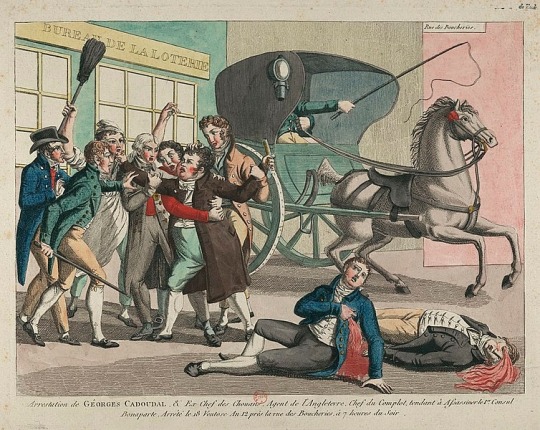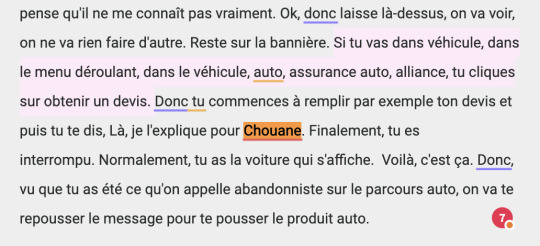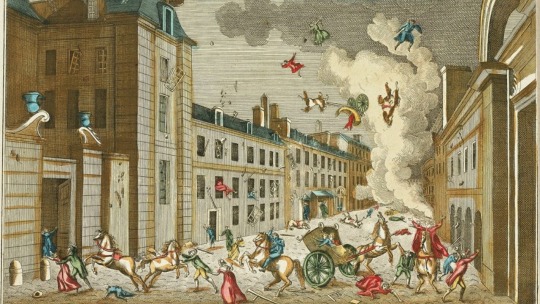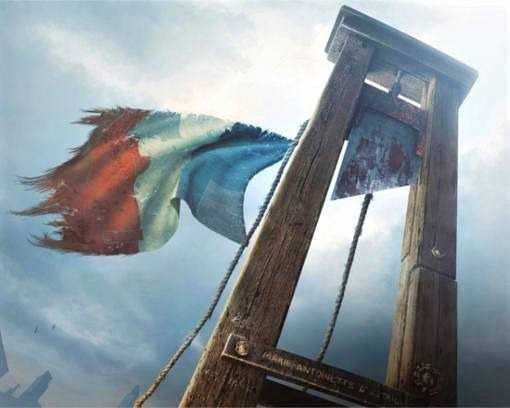#Chouans
Photo

24 décembre 1800 : attentat de la rue Saint-Nicaise contre Bonaparte ➽ http://bit.ly/Attentat-Bonaparte Premier attentat à la bombe contre un chef d’État, l’explosion rue Saint-Nicaise à l’instant même où la voiture de Bonaparte se dirige vers l’Opéra en cette veille de Noël cause nombreuses victimes et considérables dégâts matériels : si le Premier consul n’est pas touché, le drame marque l’opinion publique et donne bientôt lieu à des arrestations massives dans le milieu des jacobins, avant que trois chouans, véritables auteurs de l’attentat, ne soient identifiés au terme d’une enquête tant administrative que scientifique
#CeJourLà#24Décembre#Attentat#Bombe#Bonaparte#Premier#Consul#Rue#SaintNicaise#Opéra#Veille#Noël#Police#Enquête#Chouans#Jacobins#Fouché#Drame#Victimes#histoire#france#history#passé#past#français#french#news#événement#newsfromthepast
10 notes
·
View notes
Text





Troisième étape de mon périple dans l'Ouest pour retrouver des ami(e)s lointain(e)s : Christian en Bretagne, près de Brest. (bon, avec ma lenteur, on en est à un décalage d'un mois, c'était fin février !)
Le village de Brélès, avec l'église, typiquement bretonne. Un Saint Isidore au look de chouan, une croix de procession superbe et une bannière écrite en breton.
4 notes
·
View notes
Text
youtube
Yeah more monarchist propaganda !
Oh and made by "Le Puy du Fou", known for sh*tting on the work of historians and doing national myths.
6 notes
·
View notes
Text
0 notes
Text

#me after being fed the spicy excerpts via discord imagine when I actually read the thing#i had no idea!!#literally NONE of the queer scholars in balzaciana mentions les chouans#and believe me I totally get hyperfixing on vautrin xD#but. but.#how can younot acknowledge the republican vs royalist spies dueling homosexually#what is wrong with people!!!#fun fact: this is the first novel balzac felt proud enough to sign with his actual name#discarding his absurd noms-de-plume for good#and it’s heartwarming to see him being his little queer fan-service adjacent self from such an early stage!!#i feel like i’m always calling balzac out but we must commend him for what he does right xD
40 notes
·
View notes
Photo

Cadoudal Affair
The Cadoudal Affair, or the Pichegru Conspiracy, was a failed royalist attempt to kill or kidnap Napoleon Bonaparte (1769-1821), then the First Consul of the French Republic, and restore the House of Bourbon to the French throne. The conspiracy's discovery led to the controversial execution of the Duke of Enghien and helped facilitate the establishment of the First French Empire.
Continue reading...
23 notes
·
View notes
Text
: ̗̀➛ Book Review

╰┈➤Sum-up:
This Story take place at the end of the Directoire in 1799, France. Napoleon is ruling as the only one consulat and this time will mark the end of the french revolution. In the department of Brittany and Vendée, in the west of France, many christian royalist are still refusing the new governement, staying loyal to the monarchy and the King. The governement send the police to exterminate these people, that we call "Chouans". In this book we follow the love story between two characters, the Marquis de Montauran, a royalist and Mademoiselle de Verneuil a republican sent to help kill him.
╰┈➤ Review: [Warning; Spoiler]
This book was given to me by my brother, and i have to admit i wasn't shure i would like it. Despite the very long descriptions of, well, everything (which i was expecting), this was actually...good? The story was interesting, i don't think i was ever bored while reading it, and most of the characters were very well-writen, especially Marie de Verneuil, which was my favorite character.
Knowing it was written in the 19th century, i wasn't expecting such a good femal characters, she's strong, funny and smart and quite modern for her time. What makes her an even better character is that she's not perfect, she commit a lots of mistakes but learn from them and grow as a person along the story. Her love affair with the marquis was the most entertaining thing i have read in a while, the number of times they betray and try to kill each other is almost funny, i lost it when she tried to stab him.
But talking about the marquis, i must say that i didn't really like his character. I thought he was kind of empty if that make sense. We know very little of him in comparaison to the other characters. We can guess the personality of the other characters with what is given to us in the book, but it's really hard with the Marquis, i had the impression that he was a little useless to his cause, to be honest, which he is not since he's someone important, but it's what the book shows us. The lady accompagning him, Madame du Gua, was much more interesting in my opinion and i wish we knew more about her too.
There is a second love story in this book, between Francine, the lady in waiting of Marie, and Marche-à-terre, or Pierre. I wanted to know more, so much more. We learn in the second part of the book that they used to be lovers (we don't know if they were married, i'm guessing they were) but Pierre left her to become a "hunter of the king", which are royalist fighting for a monarchy. I think they were together for 8 years before he decided to leave. It honeslty broke my heart, because they still loved each other but were from different world which kept them apart. Something that stuck with me was when they meet again for the first time and she tells him that no matter what, for him, the king will always be more important than her. I wish i could have hug her.
The ending did left me hanging, everything happend very fast. But i thought it was good, not exeptional, but not bad. Marie sacrificing herself in order to save her lover, whom she tried to kill a glorious number of times was very beautiful and well executed, showing her courage and bravery.
I wish we knew what happend after to Francine and Pierre and to other characters like Corentin (which i despised) and Capitaine Hulot. Balzac actually hated this book, and even critisized it in the preface in the first published copy, but i though it was a very good story which is easy to understand.
>Trigger warning for domestic abuse, it's not perpetrated by a recurrent character and it happens one time.
#bookblr#booklover#books#books & libraries#bookworm#french literature#french#Les Chouans#honoré de balzac#Les Chouans Honoré de Balzac#books and reading#booklr#book blog#book review#review#book tumblr#bookish#booksbooksbooks
5 notes
·
View notes
Photo

L'Affaire Cadoudal
L'affaire Cadoudal, ou conspiration de Pichegru, fut une tentative royaliste manquée de tuer ou d'enlever Napoléon Bonaparte (1769-1821), alors premier consul de la République française, et de restaurer la maison de Bourbon sur le trône de France. La découverte de la conspiration conduisit à l'exécution controversée du duc d'Enghien et contribua à faciliter l'établissement du premier empire français.
Lire la suite...
2 notes
·
View notes
Text
Stupendous honey Amanda Baby enjoys deep penetration
Sexy babe with big tits and ass loves bukkake
Hot stepmom asslicks her latina stepteen
Handjob cumshot gay xxx Cody Domino Gets Rolled
indian girlfriend fucked in doggystyle
Luck BF Slamms Evelin Stone And Sierra Nicole
Horny Big Boobs Anime Mother Fucked Hard in The Wood
Gay family sex movies and mix of sand seamen xxx Snitches get Anal
Submissive Amateur Teen Slut Deepthroated Hard POV
Asian Sharon Lee and Lisa del sierra hot threesome
#forerun#RFP#angering#nonutile#micellarly#Berdyaev#hlqn#rhetor#Dinse#vivisectionally#expression#nabe#Chouan#streaklike#dissembling#bloodhounds#Phiomia#enamored#fabricators#mineral
2 notes
·
View notes
Link
0 notes
Text

Je me fais troller par une IA de speech to text.
(Fireflies)
0 notes
Photo

24 décembre 1800 : attentat de la rue Saint-Nicaise contre Bonaparte ➽ https://bit.ly/3xaie6Y Premier attentat à la bombe contre un chef d’État, l’explosion rue Saint-Nicaise à l’instant même où la voiture de Bonaparte se dirige vers l’Opéra en cette veille de Noël cause nombreuses victimes et considérables dégâts matériels : si le Premier consul n’est pas touché, le drame marque l’opinion publique et donne bientôt lieu à des arrestations massives dans le milieu des jacobins, avant que trois chouans, véritables auteurs de l’attentat, ne soient identifiés au terme d’une enquête tant administrative que scientifique
#CeJourLà#24Décembre#Attentat#Bombe#Bonaparte#Premier#Consul#Rue#SaintNicaise#Opéra#Veille#Noël#Police#Enquête#Chouans#Jacobins#Fouché#Drame#Victimes#histoire#france#history#passé#past#français#french#news#événement#newsfromthepast
6 notes
·
View notes
Text
Being the son of marshal Soult ...

... may not always have been fun for young Napoléon Hector. Not only because growing up under such an overbearing personality could be considered quite challenging in the first place, but also because Soult senior, at all times of his career, had a real knack for making enemies all over the place. This was especially true for the last period of his life, that he spent as minister in the July Monarchy.
The July Monarchy, from my very layman perspective, seems to have been a compromise by its very nature: a bit of First Empire nostalgia for the bonapartists, a bit of constitution and parliamentary debates for the republicans, a bit of a Bourbon monarch for the royalists. And of course, as is always the case with compromises, everybody hated it.
On 13 May 1833, Marshal Soult, as minister of War, in parliament proposed some changes to the army administration: Conscripts were to serve for three years before returning to their homes and forming an army reserve that could be called upon in times of need. This proposal was vehemently critisized by the bonapartist party, namely one former colonel Armand de Bricqueville, who saw in this change a deliberate attempt to destroy what he called "regimental spirit", the lack of which in the long run would make the army nothing but an obedient tool in the hands of the government. (Which apparently was a horrible thing.) Bricqueville, you have to give it to him, managed to put into his speech every personal insult against Soult he could think of, from accusing him of trying to bring back the Restauration, of having supported the ultra-royalists, to having been the cause for the defeat at Waterloo, even hinting at Soult having betrayed Napoleon. Some excerpts:
[...] Ah, you're right, weaken the country's forces, because they're all against you! [Call to order] Break the national instruments, [...] bring about the Restoration, that is your task, and probably your goal! [Repeated call to order] [… About Napoleon’s army at Waterloo] Its leaders were tired of war and were no longer physically or morally fit to wage it. Staff were filled with traitors [...] The loss of the battle was mainly due to that inconceivable negligence that led to essential orders not reaching General Grouchy [...], which made everyone say that the victory would have been ours if Marshal Berthier had been the major-general. [Exclamations in the centre, Marshal Soult salutes]. Unfortunately, the man who replaced him had, in 1814, in the service of the Bourbons, mistreated the old army more than anyone else. [New exclamations] He had just become intimately acquainted with the Vendéens and the Chouans of Quiberon […] There are men who, in enemy territory, have made the French name abhorred by their exactions; I could name some who in their rout did not lose a single piece of the gold that victory had brought them; who, as friends of the fine arts, we must do them justice, brought admirable masterpieces to France, and finally brought back treasures on the backs of mules, but not a single caisson or barrel of cannon. [Murmurs]
The last part obviously alluding to Soult’s retreat from Portugal in spring 1809, but mixing it with the retreat from Andalusia in 1812 (that had been anything but a rout).
I guess the overall tone of that debate gets quite clear from those snippets. Interestingly, Soult actually seemed to want to answer, but two of his colleagues prevented him from honouring these personal insults with a reply.
And that’s where Napoléon Hector, the Marquis de Dalmatie, by now 30 years old, takes the stage. Because the next thing Bricqueville received (presumably after many congratulations from his bonapartist colleagues) was a challenge to a duel from Marshal Soult’s son. It was fought on 14 May, and the four witnesses (Clausel and Jacqueminot for Soult Junior, Exelmans and Bacot for Bricqueville) put this official protocol into the Journal de débats of 15 March:
The direct attacks of M. le colonel de Bricqueville against M. the marshal minister of war in his speech of Thursday 13 June in the Chambre des Députés, having made it essential for M. the marquis de Dalmatie to seek satisfaction, a meeting took place this morning in the Bois de Boulogne between these honourable adversaries, who chose the sword as their weapon, and began a fight which lasted more than ten minutes. M. de Dalmatie hit a stone and fell backwards. Monsieur de Bricqueville hurried to offer him his hand and put him back on the right ground. The fight started again. This time, M. de Bricqueville's sword, having become entangled in M. de Dalmatie's after a fairly long struggle, slipped out of his hands. He advanced straight towards his opponent, who eagerly gave him back his weapon. After a rest necessitated by such a vicious attack, the fight resumed; the adversaries rushed at each other and soon came to grips face to face. In this situation, the witnesses, who were, on one side for the Marquis de Dalmatie, Marshal Clausel and General Jacquéminot, and on the other side General Excelmans and Mr César Bacot, Member of Parliament, threw themselves between them and declared that, as men of honour, they should not allow such a stubborn engagement to continue. The two combatants submitted to this decision and went their separate ways, showing each other frank and loyal esteem.
Paris, 14 June 1833.
To me this sounds a lot as if all four of the witnesses were mostly there in order to watch the two idiots stumble around a little and to make sure that nobody got really hurt. There are different reports about this incident, some even claiming that Bricqueville actually did injure the marquis de Dalmatie or that the latter was fighting in earnest. Anyway, the official report is the one above.
In how far Soult himself was behind or informed of the duel, I do not know. Gotteri seems to not mention this at all in her book, and Brun de Villeret at the time was not in Paris. Only why Soult himself did not make the challenge seems clear: He was already 64 years old in 1833 and rather not fit for hand-to-hand combat.
But this was not the only incident in which a dissatisfied officer expected the son to stand in for his father: a certain maréchal-de-camp Hulot d’Aussery (or d’Osery; a distant relative of one of Soult’s former aides) that same year asked for an interview with the marquis de Dalmatie and, as soon as he was received, challenged him to a duel, because Soult as minister of War had not made Hulot a lieuténant-général yet, as Soult’s predecessor Gérard had promised. Napoléon-Hector, presumably somewhat confused (he was neither involved in the affairs of the ministry nor was he even part of the military, but had become a diplomat) refused the challenge but promised to talk to his father about it. Soult senior sent one of his aides to Hulot who tried to talk some sense into him, but to no avail. (According to one anecdote, Soult did not take the whole thing very serious, telling Hulot: So sorry, but I only do duels with cannonfire.)
Disgruntled Hulot did not let it go. The minister of the Interior interfered next, telling Hulot to stop that nonsense. Hulot then sent two highly insulting letters to Soult junior, probably hoping Napoléon Héctor would feel offended enough to now accept the challenge. When both father and son Soult instead decided to sigh, shrug and ignore the whole matter, Hulot had the letters published in the republican journal La Tribune:
Marquis of Dalmatia, you are an insolent coward! Wherever I meet you, I will stamp your face with the seal of infamy! If life is dear to you, then live at this price...
Nope. Being the son of marshal Soult, probably not always fun.
13 notes
·
View notes
Text
9 ppl you’d like to know better
thank u for the tag Pizza!! :))) @pizza-hats-of-the-world-1882
3 ships: Dorian/Basil, but I don’t mind if Harry joins the picture. And a hundred other ships, just because I don’t draw them now doesn’t mean I don’t like them anymore.
first ship: i don’t really remember lmao
last song: Why Would You Be Loved-Hozier
currently reading: the Chouans/the Plays of Oscar Wilde/History of Romanticism. I wonder why i never finish books.
last movie: Marceau ou les enfants de la republique! Groupwatched with Christine and Janelle. Watched for Denis Manuel, stayed for slideshows and Pascal. (Oh Pascal my beloved) It was a fun movie overall, kudos to Christine for explaining the scenes since we had no subs.
currently craving: holidays, vacations, and retirement
tagging: damn i’d like to know all my mutuals better but i’m shy ajksjskksj
3 notes
·
View notes
Text

Un général chouan est allé à la mort ainsi. Il était debout sur la charrette, la foule le conspuait, lui lisait. Au pied de l’échafaud, avant de monter les marches vers la guillotine, il a corné la page !
Sylvain Tesson. Géographie de l’instant.
6 notes
·
View notes
